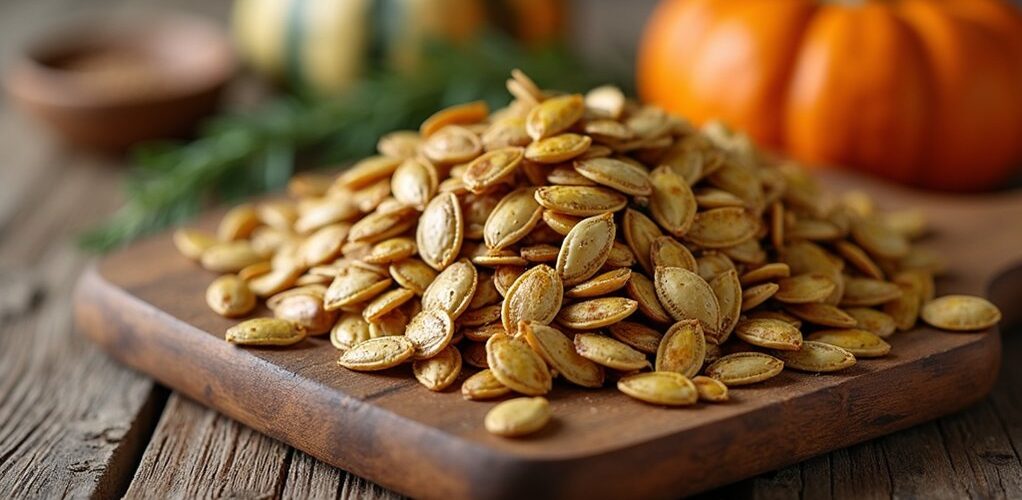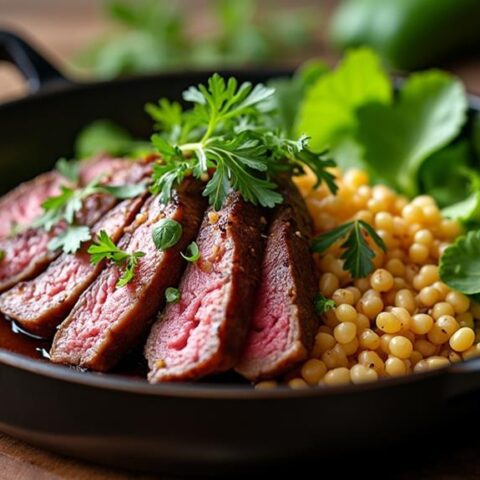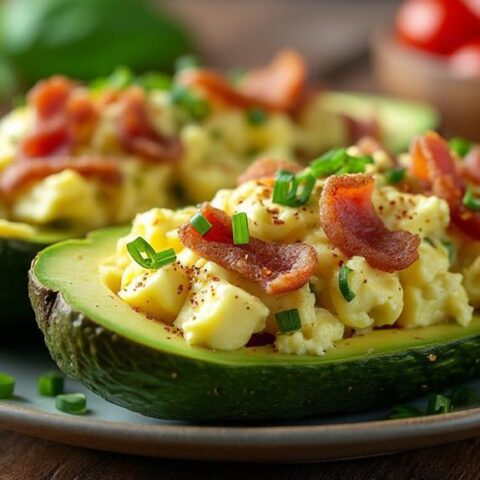
Pumpkin seeds contain moderate carbohydrate levels, with one ounce providing 15.2 grams of total carbs and 10 grams of net carbs after subtracting fiber. While not the lowest-carb option, they offer significant nutritional benefits, including 5.3 grams of protein, healthy fats, and essential minerals like magnesium and zinc. For those following low-carb diets, portion control is key – stick to one-ounce servings to maintain carb limits while gaining valuable nutrients. Understanding the complete nutritional profile reveals their ideal role in a balanced diet.
Key Takeaways
- One ounce of pumpkin seeds contains 10 grams of net carbs, making them moderate in carbohydrate content.
- Portion control is essential, as a single serving provides 3.8 grams of net carbs for those following low-carb diets.
- Compared to chia and flax seeds, pumpkin seeds have higher net carbs but offer significant protein and healthy fats.
- The fiber content of 5.2 grams per ounce helps slow sugar absorption and minimize blood glucose impact.
- Pumpkin seeds can fit into low-carb diets when consumed in moderation and properly portioned.
Understanding Pumpkin Seed Macronutrients
While pumpkin seeds are often celebrated as a nutritious snack option, their macronutrient profile requires careful consideration for those monitoring their daily intake.
A standard one-ounce serving size contains significant amounts of protein and healthy fats, providing 5.3 grams and 5.5 grams respectively. However, pumpkin seeds are also high in carbohydrates, containing approximately 15.2 grams of total carbs per ounce, with 5.2 grams of dietary fiber, resulting in 10 grams of net carbs.
For individuals following low-carb diets or a ketogenic diet, this carbohydrate intake can be substantial, as multiple servings can quickly accumulate. Understanding these macronutrients is essential, as the high carbohydrate content may make pumpkin seeds less suitable for those strictly limiting their daily carb consumption.
Net Carbs vs. Total Carbs in Pumpkin Seeds
Understanding the difference between net carbs and total carbs in pumpkin seeds helps consumers make informed dietary decisions.
Pumpkin seeds contain approximately 17.49 grams of total carbs per 100 grams, with 3.9 grams of dietary fiber, resulting in 13.6 grams of net carbs. When considering a standard serving size of one ounce (28 grams), this snack provides about 15.2 grams of carbohydrates and 5.2 grams of fiber, yielding roughly 10 grams of net carbs.
A single serving of pumpkin seeds packs 15.2g total carbs and 5.2g fiber, making them a moderate-carb snack option.
The carbohydrate content of pumpkin seeds may pose challenges for those following strict low-carb or ketogenic diets, which typically restrict daily carb intake to 20-50 grams. A ketogenic diet, known for its ability to reduce blood glucose levels, requires careful monitoring of carbohydrate intake to maintain ketosis.
A single handful (28 grams) contributes approximately 3.8 grams of net carbs, making portion control essential for maintaining dietary requirements.
Portion Control Guidelines for Low-Carb Diets
Effective portion control plays an important role in successfully incorporating pumpkin seeds into low-carb dietary plans. With 3.8 grams of net carbs per ounce, careful monitoring consumption becomes vital for maintaining carbohydrate limits. A single serving size of one ounce provides 126 calories and 5.5 grams of fat, making pre-portioning necessary for managing daily intake. Pumpkin seeds are also rich in essential nutrients like magnesium, zinc, and healthy fats, which support overall well-being on a keto diet. For ideal portion control on low-carb diets, consider these guidelines:
- Pre-portion pumpkin seeds into single-serving containers of one ounce each.
- Incorporate small amounts as garnishes on salads or yogurt rather than consuming as standalone snacks.
- Track total daily carbohydrate intake when including multiple servings of pumpkin seeds.
This measured approach guarantees that pumpkin seeds can be enjoyed while maintaining ketogenic or low-carb dietary requirements.
How Pumpkin Seeds Fit Into Ketogenic Eating
The inclusion of pumpkin seeds in a ketogenic diet requires careful consideration due to their moderate carbohydrate content. While these seeds offer beneficial healthy fats and protein, their net carbs can greatly impact daily carbohydrate intake limits. A single serving of pumpkin seeds contains 3.8 grams of net carbs, which represents a substantial portion of the 20-50 gram daily allowance on a ketogenic diet. For those committed to maintaining ketosis, alternatives like flaxseeds may be more suitable. While pumpkin seeds aren't strictly forbidden on a low carb eating plan, portion control becomes vital to prevent exceeding carbohydrate limits. Individuals following a ketogenic lifestyle should carefully monitor their consumption and consider whether the nutritional benefits outweigh the potential impact on their metabolic state. Additionally, keto-friendly sweeteners like stevia and erythritol can provide sweetness in recipes without adding excessive carbs, helping to maintain ketosis while enjoying flavorful meals.
Essential Minerals and Micronutrients
Beyond their role in low-carb diets, pumpkin seeds stand out as remarkable sources of essential minerals and micronutrients that support numerous bodily functions.
These nutrient-dense seeds deliver an impressive array of minerals that contribute to overall health benefits and peak bodily function.
The key mineral content in a one-ounce serving includes:
- 74.3 mg of magnesium, supporting over 300 biochemical reactions
- 2.92 mg of zinc, providing 20% of daily needs and boosting immune function
- 252 mg of potassium, helping maintain healthy blood pressure levels
Additionally, pumpkin seeds contain significant amounts of phosphorus for bone health and copper for iron metabolism.
This combination of essential minerals makes them an excellent choice for health-conscious individuals seeking nutrient-rich, low-carb snack options. A diet rich in such minerals can complement improved metabolic health, which is a benefit associated with approaches like the ketogenic diet.
Blood Sugar Impact and Glycemic Load
Managing blood sugar levels becomes considerably easier with pumpkin seeds, which boast a remarkably low glycemic load and minimal impact on blood glucose.
With only 3.8 grams of net carbs per one-ounce serving, these seeds provide a satisfying low carb snack option without compromising blood sugar stability.
Pumpkin seeds make an ideal low-carb choice, delivering just 3.8g net carbs per ounce while keeping blood sugar levels steady.
The impressive fiber content in pumpkin seeds plays an essential role in moderating carbohydrate absorption.
At 5.2 grams of fiber per ounce, these seeds effectively slow down sugar absorption into the bloodstream, helping to stabilize blood sugar levels throughout the day.
For individuals monitoring their carbohydrate intake, pumpkin seeds offer a practical solution, as their total net carb content remains modest at 13.6 grams per 100 grams when consumed in moderation.
Additionally, the keto diet benefits for Type 2 diabetes are supported by studies showing improved insulin sensitivity and reduced blood glucose levels, making low-carb snacks like pumpkin seeds an excellent choice for diabetics.
Smart Storage and Preparation Methods
Proper storage and preparation techniques greatly impact the quality and shelf life of pumpkin seeds, with airtight containers in cool, dry locations being essential for maintaining freshness.
The initial preparation process includes thorough rinsing to remove pulp, followed by an optional but beneficial soaking period of 1-4 hours to enhance digestibility and reduce phytic acid content.
Roasting the seeds at a moderate temperature of 250°F for approximately 45 minutes, while seasoned with olive oil and preferred spices, creates an ideal balance of flavor and nutritional preservation.
Keep Seeds Fresh Longer
Smart storage techniques can greatly extend the shelf life of pumpkin seeds, preserving both their nutritional value and appealing taste. To keep seeds fresh longer, proper storage conditions and handling methods are essential for maintaining quality and preventing spoilage.
For ideal freshness, follow these key storage guidelines:
- Store unopened pumpkin seeds in a cool, dry place, and transfer opened packages to the refrigerator.
- When preparing fresh seeds from a pumpkin, clean thoroughly and refrigerate immediately after removal.
- After roasting, place seeds in an airtight container at room temperature.
These practices help maintain the seeds' crisp texture and rich flavor.
When preparing to roast, season with olive oil and desired spices, then bake at 250°F for approximately 45 minutes until golden brown for maximum taste and nutritional benefits.
Proper Container Selection Tips
The right container makes all the difference when storing pumpkin seeds, impacting both their shelf life and flavor retention. When selecting storage containers for this low carb snack, airtight options prove essential in maintaining peak freshness and preventing moisture-related degradation.
Glass jars with secure lids, food-grade plastic containers with snap-tight seals, or vacuum-sealed bags work effectively for both store-bought and whole roasted pumpkin seeds.
For those practicing portion control, small, individual containers help manage calorie intake while preserving the nutritious snack's health benefits.
When storing freshly prepared seeds, verify they're completely dry after roasting before transferring them to storage containers.
Those planning long-term storage should consider refrigerator-safe containers, as cooler temperatures extend shelf life while maintaining the seeds' natural properties.
Roasting For Best Results
Mastering the roasting process transforms raw pumpkin seeds into a delectable, nutrient-rich snack while maximizing their shelf life potential.
For best health benefits and a satisfying low carb outcome, proper preparation is essential. Fresh pumpkin seeds should be thoroughly cleaned and dried before roasting to prevent bacterial growth and guarantee the best texture.
For ideal results, follow these key steps:
- Remove seeds immediately after cutting the pumpkin and rinse thoroughly to eliminate pulp.
- Roast at 250°F for 45 minutes, tossing with olive oil and preferred seasonings.
- Store in an airtight container at room temperature, or refrigerate for extended freshness.
This method enhances the nutritional profile while creating a perfectly crunchy snack that maintains its quality over time.
Comparing Pumpkin Seeds to Other Low-Carb Snacks
While pumpkin seeds offer numerous nutritional benefits, their net carbohydrate content of 13.6 grams per 100 grams places them higher on the carb spectrum compared to other popular seed-based snacks. When planning a low-carb meal plan, it's essential to evaluate alternatives like flaxseeds and chia seeds, which contain considerably fewer net carbs. A high-carb snack should be avoided on a keto diet as it can disrupt ketosis and hinder progress.
| Seed Type | Net Carbs per 100g |
|---|---|
| Chia Seeds | 1.5g |
| Flaxseeds | 1.9g |
| Sunflower Seeds | 11.4g |
| Pumpkin Seeds | 13.6g |
Although pumpkin seeds are nutrient-dense, their carbohydrate content requires careful portion size monitoring for those following strict low-carb diets. Individuals seeking to minimize their carb intake may find chia seeds and flaxseeds more suitable for regular consumption while reserving pumpkin seeds for occasional enjoyment.
Health Benefits Beyond Carb Content
Beyond their carbohydrate profile, pumpkin seeds stand out as a nutritional powerhouse, offering an impressive array of health-promoting compounds and benefits.
These low-carb seeds deliver essential nutrients that support multiple aspects of health, from digestive wellness to cardiovascular function.
Key health benefits include:
- Rich protein content of 5.3 grams per ounce supports muscle maintenance and aids in weight management through improved satiety.
- Significant magnesium levels promote cardiovascular health by regulating blood pressure and enhancing circulation.
- Powerful antioxidants combat inflammation while supporting immune function, with additional benefits for men's prostate health.
The combination of dietary fiber, protein, and essential minerals makes pumpkin seeds an excellent choice for those seeking extensive nutritional support while maintaining a low-carb lifestyle.
Additionally, research shows that pumpkin seeds can contribute to improved insulin sensitivity, which is crucial for managing Type 2 diabetes and stabilizing insulin mechanisms.
Best Ways to Include Pumpkin Seeds in Low-Carb Meals
Incorporating pumpkin seeds into low-carb meals opens up numerous creative possibilities for enhancing both nutrition and flavor without derailing dietary goals. These versatile seeds, with their moderate carb content of 3.8 grams per ounce, can be strategically added to various dishes while maintaining healthy eating patterns. For those following low-carb diets, pumpkin seeds serve as an excellent addition to salads, providing both crunch and nutritional value. They can also enhance soups and stews as a topping, while boosting protein content and healthy fats. Creating homemade granola or trail mixes with pumpkin seeds offers a convenient healthy snack option, and adding pumpkin seeds to smoothies, particularly when combined with low-carb fruits, creates a nutrient-dense beverage without excessive carb intake. Additionally, pairing pumpkin seeds with non-starchy vegetables like spinach and kale can further enhance the nutritional value of your meals while keeping carb levels low.
Frequently Asked Questions
Are Pumpkin Seeds Ok on a Low-Carb Diet?
Pumpkin seeds offer nutritional value but contain moderate carbs, making them less ideal for strict low-carb diets. Consider portion control or lower-carb alternatives like flaxseeds while prioritizing overall dietary fiber and protein sources.
Can You Eat Pumpkin Seeds as a Snack?
Pumpkin seeds make an excellent snack option, offering diverse health benefits and a robust nutrient profile. With proper portion control, they can be enjoyed raw, roasted, or seasoned, providing a convenient energy boost throughout the day.
What Is the Best Time to Eat Pumpkin Seeds?
Pumpkin seeds offer versatility throughout the day: providing morning energy in breakfast, serving as a midday pick-me-up, fueling pre/post workout activities, and making an ideal evening snack to promote better sleep.
What Do Pumpkin Seeds Do to Your Gut?
Pumpkin seeds enhance gut health through fiber content and probiotic effects. They support digestive benefits, improve nutrient absorption, and promote healthy gut microbiome while offering anti-inflammatory properties and potential bloating relief.
Conclusion
Pumpkin seeds emerge as an excellent choice for low-carb and ketogenic diets, offering a balanced nutritional profile with minimal net carbs and abundant healthy fats. When consumed in appropriate portions, these nutrient-dense seeds provide essential minerals, protein, and fiber while helping maintain ketosis. Their versatility in recipes, convenient storage, and impressive health benefits make them a smart addition to any low-carb eating plan, provided portion sizes are monitored.








No Comments